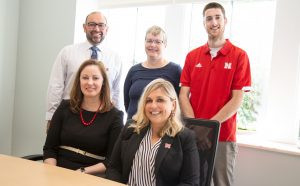
As frontline caregiving professionals, Nebraska Extension professionals provide vital assistance to communities during the state’s disaster response and recovery efforts, and offer a lifeline for many struggling to cope during times of crisis.
Holly Hatton-Bowers, assistant professor of child, youth and family studies, is the program director of a national project funded by the U.S. Department of Agriculture and housed at CYFS, focused on supporting the wellness of Extension personnel following natural disasters.
She and her team have developed a Reach Out for Wellness Toolkit to help the Extension professionals cope with the challenges of their work by better understanding their own well-being and learning practical coping strategies. The resource also simplifies the process of seeking support.
“We know one of the best ways to combat compassion fatigue, stress and burnout — especially in a stressful situation — is to have some awareness of how you’re doing and coping,” Hatton-Bowers said. “This toolkit provides research-based strategies to support wellness and well-being and to increase that awareness.”

The toolkit includes two interactive, web-based products designed to combat Extension employee burnout, empathy fatigue and turnover — all while enhancing workplace engagement.
The Reach Out for Wellness Course on Extension is designed to support the mental health needs of Extension professionals, and to help them better understand their co-workers’ wellness. It features five modules with engaging videos and additional resources to help individuals reflect on their current wellness and learn strategies to support needs associated with disaster recovery.
The Disaster Recovery Self-Assessment asks employees a set of questions that explore six wellness dimensions important for overall health. At the end of the 10-minute assessment, an individualized report is generated that includes a wellness score and recommended strategies to address specific wellness needs.
The website and toolkit were developed in partnership with the CYFS communications team.
After using the resources, Hatton-Bowers said, Extension personnel are expected to better understand their own wellness and how to seek help from their support system. Additionally, Extension employees’ improved wellness is expected to lead to more supportive work with individuals and communities recovering from a natural disaster.
“Self-awareness is an individualized experience,” Hatton-Bowers said. “What I do to support my wellness is different than what others do to support their wellness, especially during a disaster and other stressful moments. We want to be able to provide strategies that will help everyone address their specific needs.”
In fall 2021, the toolkit was presented at the Extension Disaster Association Network (EDAN) conference, and received positive feedback. Attendees told Hatton-Bowers they anticipated being able to have their personnel use the self-assessment tool, and discussed plans to use the educational modules as part of new Extension personnel’s onboarding process.
Hatton-Bowers said the team will continue to develop ways to expand the wellness resources, such as blogs for people to share their experiences and tips, and adding online courses on various topics.
“We want this to be a springboard to lead to additional resources, education and content to support Extension employees,” she said.
Learn more about this project in the CYFS Research Network. This project aligns with the College of Education and Human Sciences’ Grand Visions of strong communities and comprehensive health and well-being, and with the UNL Grand Challenges of health equity.
